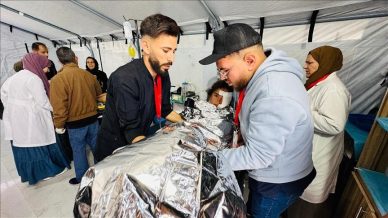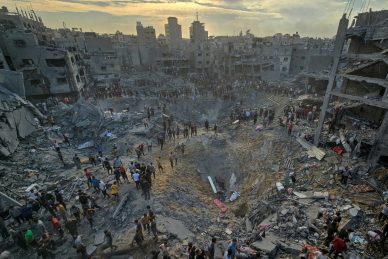Eid al-Adha in the Gaza Strip this year is marred by the economic hardships endured by its families in view of the 13-year-long Israeli blockade and the Palestinian Authority sanctions.
The Gaza Strip employees are no longer able to buy livestock for Sacrifice due to the crippling siege and the salary cuts imposed by the Palestinian Authority since 2017.
Most Palestinian families in Gaza cannot afford to buy meat on normal days and impatiently wait for Eid al-Adha where meat is distributed among relatives friends neighbors and the poor.
The punitive measures waged by the Palestinian Authority against the Gaza Strip in recent years have adversely affected thousands of Palestinian families in all aspects of life including Eid seasons.
Some families buy Eid al-Adha’s livestock in installments over several months with the help of civil society institutions. The prices of livestock are not so high but the difficult economic conditions have pushed people to do so.
The PIC talked to a number of farmers who affirmed that the demand for sacrificial animals despite the low prices is the lowest in years which will reflect negatively on the Eid season.
Jaber al-Nayrab who has a livestock farm said “Even the charities that used to buy in large numbers decreased their demand by almost 50%.”
Al-Nayrab who talked to the PIC only a few days ahead of Eid al-Adha said that he managed to sell half of the 100 cows and calves in his farm. “If the other half is not sold before Eid their price will significantly drop after Eid ends” he added.
Jamal al-Khudari head of the Popular Committee Against the Siege on Gaza said that the poverty and unemployment rates in Gaza have exceeded 85% and 60% respectively while the per capita daily income is about two dollars.
Al-Khudari said that the Gaza Strip and the West Bank markets witnessed a commercial recession on the eve of Eid al-Adha and the new school year season where the sale rates fell by up to 80% in Gaza and 50% in the West Bank.
He pointed out that the situation in the Gaza Strip is getting worse each passing day with the absence of donors and the lack of aid by international and Arab countries in all sectors.
He stressed that the radical solutions required immediately begin with ending the Israeli blockade completely opening all border crossings and allowing free import and export.














